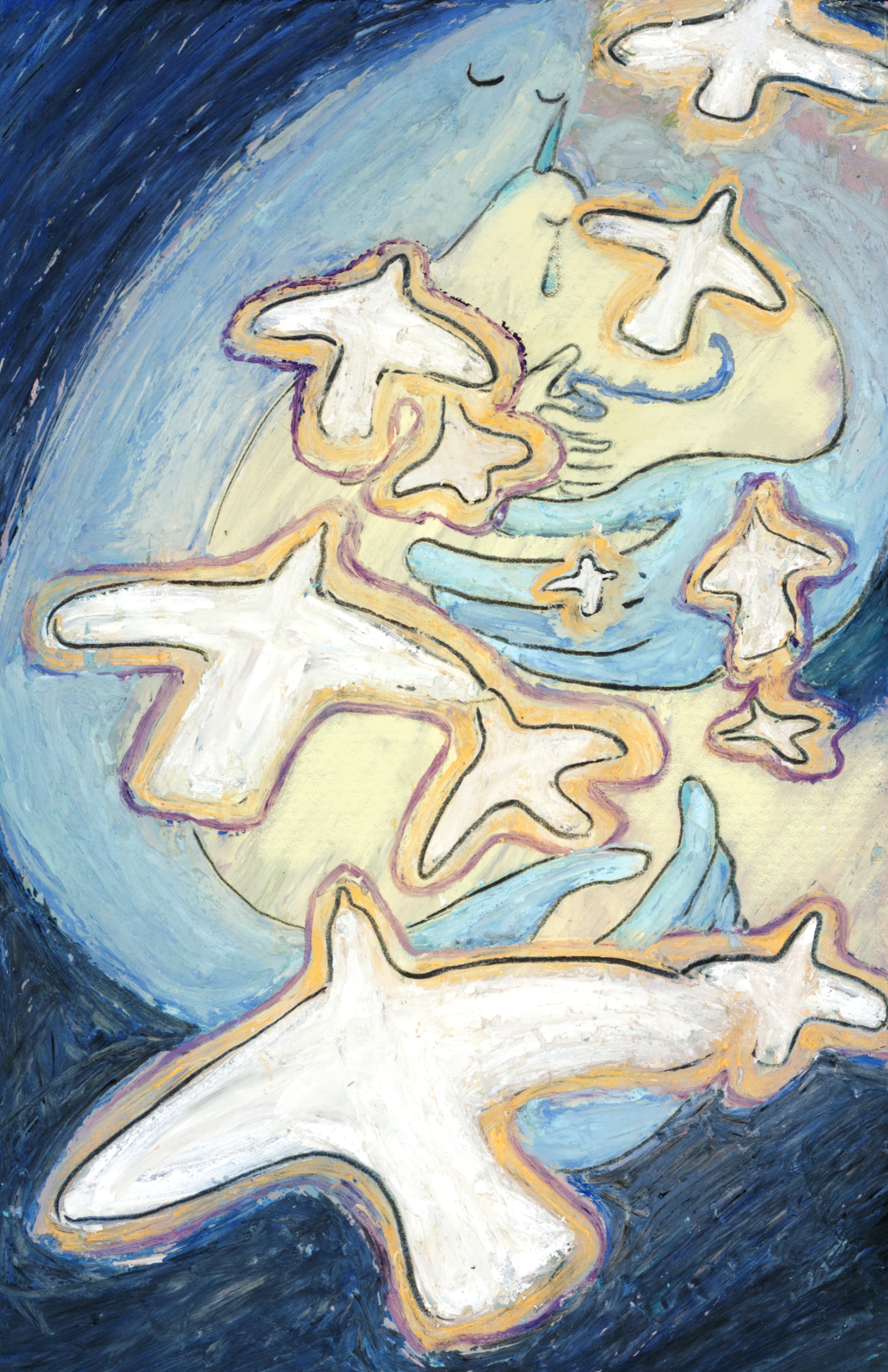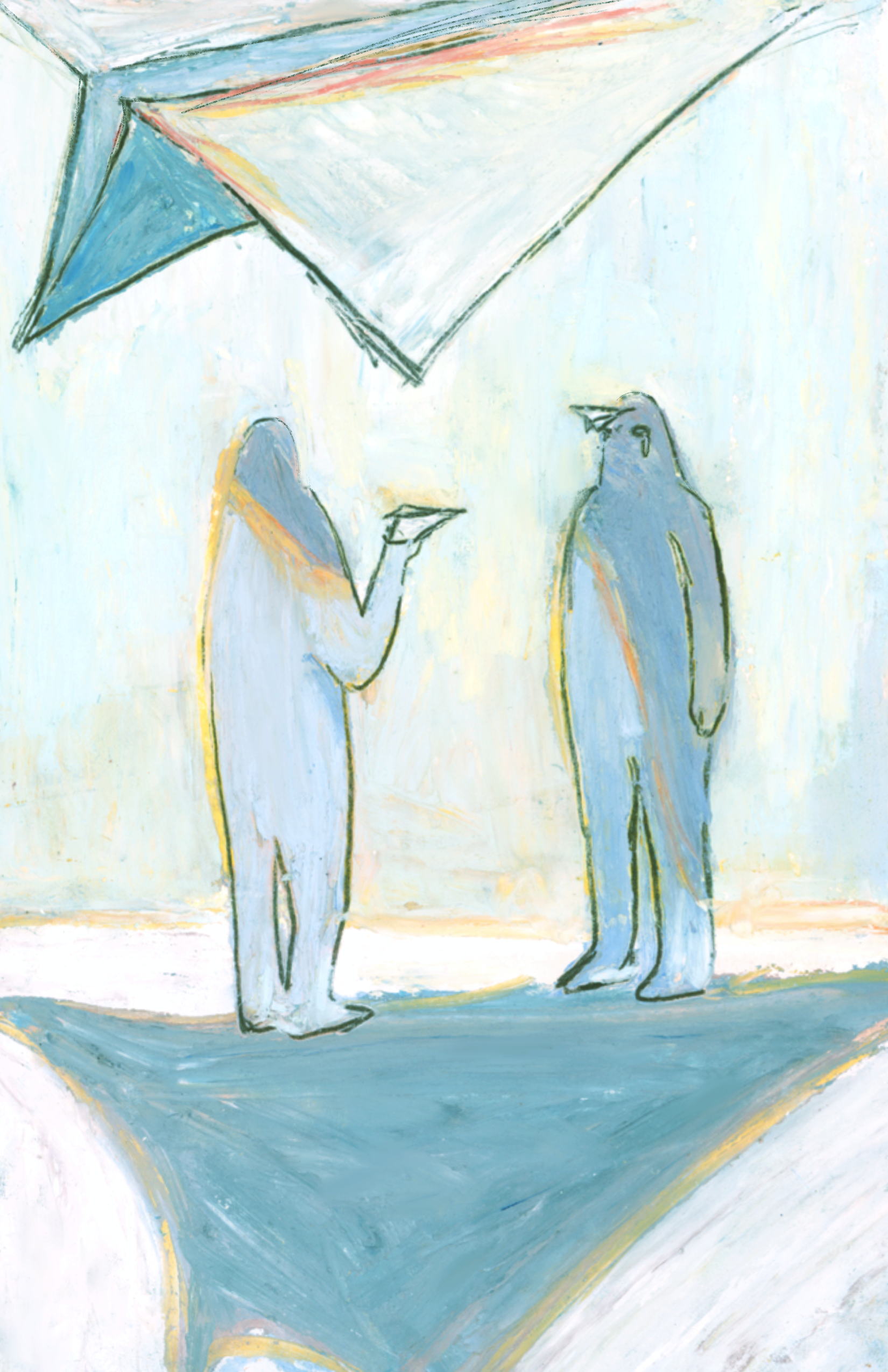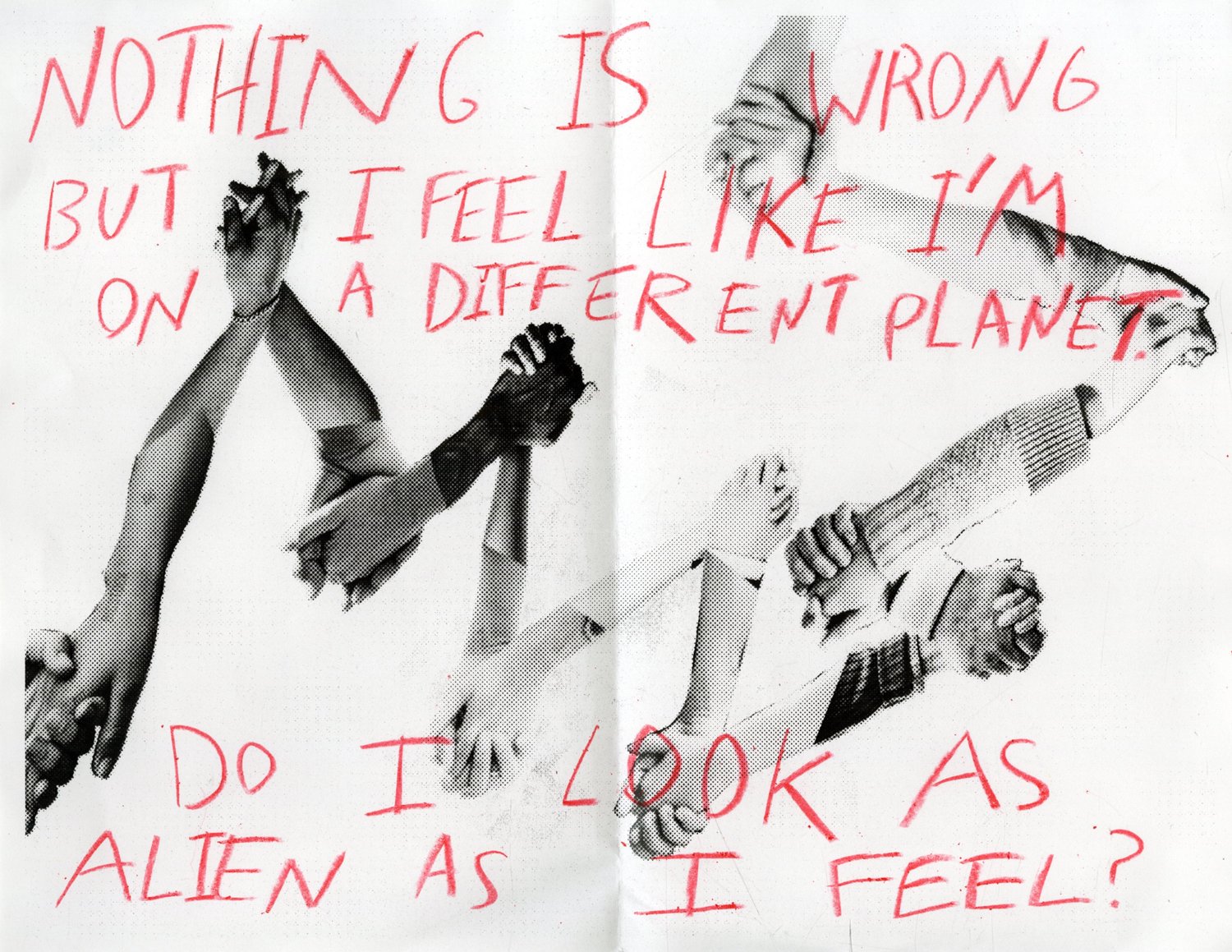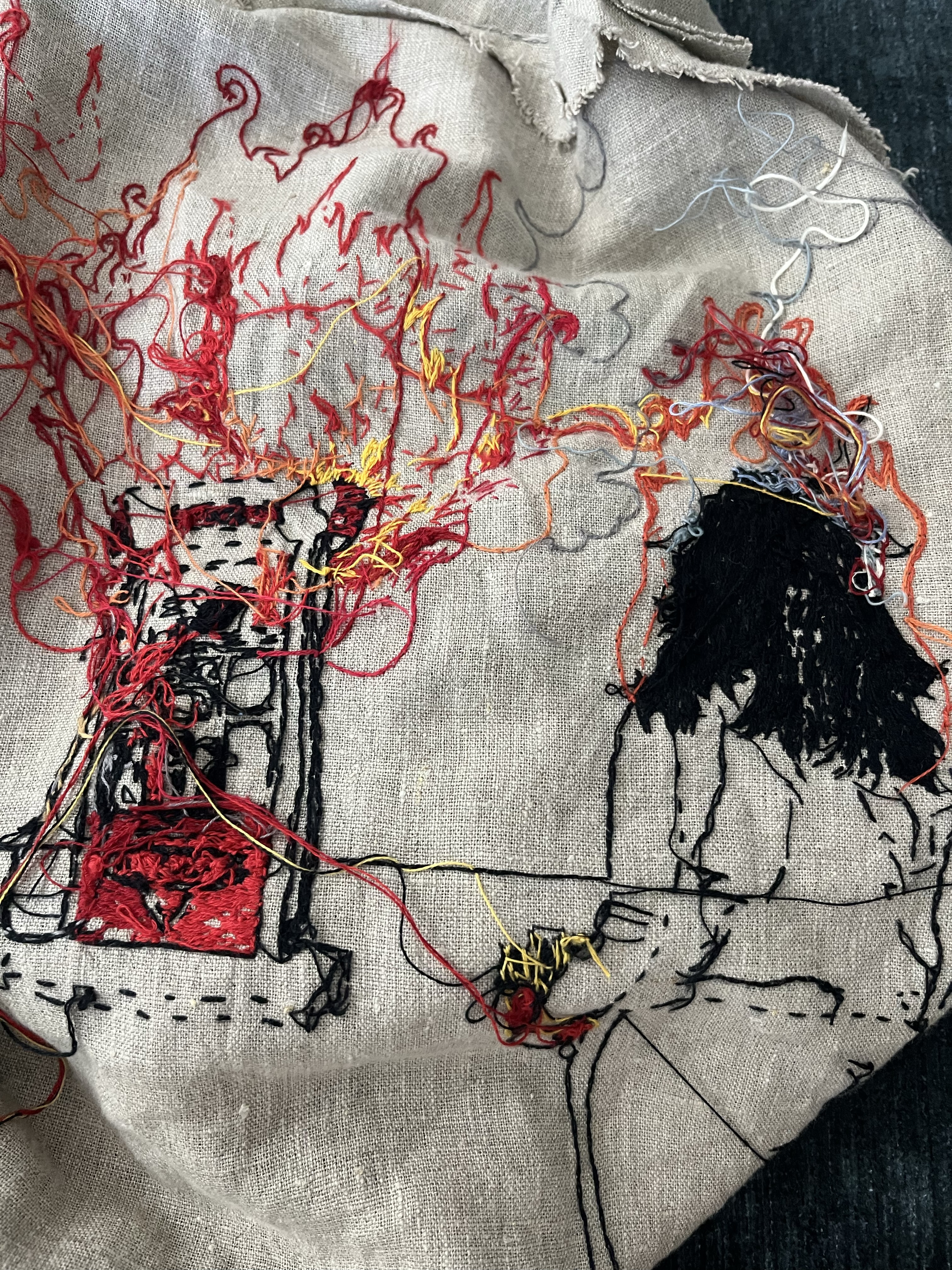Full Disclosure
Full Disclosure
Arete Xu
→BFA SC 2026
Mina Troise
→BFA ILL 2025
Content warning: This piece contains mentions of mental health crises and experiences of survivors of sexual assault.
Full disclosure: these projects are hard to talk about. If you’re feeling overwhelmed right now, consider this a moment to step away, practice care, and take a breather. Are you back?
As artists and designers, we often find ourselves deeply empathizing with those around us, working with experiences of hardship as a guiding force. This semester, v.1 received multiple submissions of community research projects from the Illustration department, each centering sensitive experiences: RISD CRY, by Yimiao Wang; Trans Confessional by November Stanley; and Kill Your Rapist by Maren Curtis. Using research methods like anonymous forums, interviews, and voluntary disclosures, these illustrators invited participants to share their intimate thoughts, addressing each submission with deep compassion. The similarities between these projects led us to ask: How can we conduct sensitive research with care? How does authorship function when a project is reliant on community participation? And how does this vulnerable and humanized approach redefine what research is, and can be?
1. RISD CRY by Yimiao Wang (MFA ILL 2025)
RISD CRY is a participatory project empowering the RISD commun-ity to share their emotional moments in a safe, destigmatized environment. Wang, a self-identified reluctant community organizer, began this project by soliciting stories of people crying with posters all around campus. She synthesized these stories into a body of work that includes illustrations, zines, and a website map that marks where students cried and why. Her goal is to reframe crying or expressions of distress “not as personal dysfunctions to be managed, but as natural responses to systemic pressures.” Wang had also spoken with various staff members and she received help especially from Bethany Jankunis, a co-chair of the Holistic Student Wellness committee, and the RISD Health and Wellness Ambassadors. She reflects on the isolating experiences she’s had over her time at RISD and how she found solace by connecting to the external landscape:
AX Tell me a bit about how RISD CRY started. What made you decide to do this project for your Illustration grad thesis?
YW I got really overwhelmed during my first year here. I unfortunately got hospitalized, and it was a quite traumatic experience. Basically your autonomy is stripped away from you for risk-containment reasons. After I got discharged from the hospital, I was reading articles written in the ’70s and ’60s—there was a whole anti-psychiatry movement back then questioning involuntary hospitalization and the scientific basis of psychiatric diagnoses. And I was just thinking, how can I personally move away from a diagnostic model and let people express their emotional struggles and distress? I wanted to use humor and a little bit of passive aggressiveness to encourage people to laugh about what they feel.
AX Is this artistic research to you? And did you receive any resistance in the academic context?
YW I wouldn't say I encountered that particularly, because all of my professors are super chill, and they encourage you to incorporate your personal experience. I mean, it is, technically, collecting data. But I wouldn’t say you collect data and analyze it in a hardcore scientific way. It’s not solving problems. If it’s possible I’d like it to not be “research.” I would just call it like, generating knowledge through a methodology that would traditionally fit in an academia context. We're allowed to do that in the Illustration MFA program, so I really appreciate that. I also have a background in Gender Studies, so I already see personal experiences and storytelling as a way of researching a subject matter.
Yimiao is interested in how people will engage with the RISD CRY online campus map in her thesis show and beyond. She considers this to-and-forth dialogue to be the crux of her project.
AX How are you handling the fact that you’re turning these private anonymous disclosures into an outward final product, in both your website and your drawings? What outcome do you want to achieve and what do you think is your role as the author of this project?
YW I was really sensitive about research ethics, so there is a disclaimer and people were informed that their entries might be illustrated or become part of a presentation. I don’t want to do it in a way that’s like, Oh my god, people are so sad and traumatized, or make them like the victim[s] of RISD. I also don’t want to exploit other people’s vulnerability, because those people were generous enough to share. So it was more like I was trying to channel the emotions within those entries, and draw really abstractly—trying not to draw any specific human form, of course, and not any specific location.




AX What kinds of reactions have you gotten to this project?
YW I guess people’s reaction has been really positive and supportive. It’s just amazing, because I’m a really introverted person. I’m not saying I'm not able to conduct social interaction or anything, but if it wasn't for the sake of the project, I don't think I would be able to connect with that many people about their genuine thoughts on their most vulnerable moments. One time I was posting this flyer at CIT and I saw this person just trying to get out with their bicycle, and they were like, Oh my god, that's RISD CRY! Can I sign now? I just cried! I was like, Yeah, here's the pen.
AX How has this project affected you and what do you ultimately want people to take away?
YW I feel like negative feelings, it's a cliche, but there are two sides of a coin. You feel the sadness because you have hope and expectations but you lost them. Or you lost them temporarily, so you are grieving. And so I feel like, even if the participants are expressing sadness, I think they are also, honestly, expressing hope.
A lot of people want to achieve a lot of things, as artists, as students, as individuals. But there’s also relationships. Some people even talk about how their friends didn't show up in class, and they cried because they felt like they couldn't lose another friend. I feel like it's actually so positive that there’s something in their life that they see as important enough to give such a strong emotional response.
2. Trans Confessional by November Stanley (BFA ILL 2025)
Trans Confessional is an illustrated zine featuring anonymous con-fessions from RISD’s trans community. Starting his sophomore year, November began collecting confessions for his first volume, Self Recognition Through the Other, which was distributed in Spring of 2023. A year later, he followed up with the second volume, I Unearth Myself For You. Some pieces are illustrated in reserved pencil, and others in jagged collage; each medium is chosen to suit the confession, adding dimension to the voice of the anonymous speaker.
MT What is your experience with feeling “ownership” of this project, even though it is predicated on the anonymous disclosures of others?
NS I thought a lot about authorship, both with the first and second volume of Trans Confessional. Nowhere on the front cover does it say “by November Stanley.” It wouldn’t make sense for it to. I have a lot of mixed feelings about the authorship, because these are other people's stories that I'm telling, and at the same time, I am interpreting them and reinterpreting them to be shared. So it is not their pure, undiluted story anymore. I'm affecting it, and it's a strange mixed authorship of their perspective plus my perspective, and that's what the confessions end up becoming. In a project that's all about sharing other people's stories and bringing attention to the diversity in our community, it doesn't make sense for it to have an author, and that's not the type of figure I want to be. I view myself more as a distributor than an author.
MT What’s your experience with the responsibility of stewarding other people's experiences?
NS I get a lot of really diverse confessions submitted to me, and some of them, I don't feel comfortable handling, or some of them, I’m like, I need to wait to do this one, because I don't think I'm well equipped to do this. It's a shame that I feel that way, because everyone should have their confession and story told. But there are just some topics, especially when it comes to intersectionality, that are so important and interesting for me to read, but not something that I feel well equipped to share. I illustrated almost every confession. And I felt a responsibility to make sure that they were represented in a way that resonated with the people who wrote them, and I just don't think I was the person to do that in a few cases.


MT Have you experienced any criticism for Trans Confessional?
NS The criticism I've received for this project has been mainly around the money aspect of it, and the financial gains of selling it. For the first volume, I was going to sell each zine for $5, and then I had a fellow student send me a message about how that is unethical, and how I am profiting off of the stories of marginalized people. And that really struck a chord in me, and I was like, Oh shit, you're so right, my bad. In the first year, the zine was completely free. But the project is completely self funded, and a lot of money goes into printing and binding. So the second year, I did sell them for money, but mainly just to make sure that I broke even with my prints. There is an ethical dilemma to profiting off of the stories that other people write. I've been very open and sensitive to people's criticism, because the trans experience is so diverse and unique to each individual, and I have a very specific perspective. I want to listen and really act on the critique I receive, because I think it's all really important. It's not a solo project. I am not the author. It is collaborative, and that comes with criticism.
MT I would love to hear any advice you have for making a project that's based in community submissions. What would you say to someone else who's doing something like this, particularly someone who is handling the sensitive disclosures of other people?
NS Let me think about my words of wisdom . . . Well, this isn’t advice, but for sure, my main takeaway is the absolute importance of community. After I graduate, I am going to work very hard to find community wherever I am. I started this project because I felt like I had no community with other trans people here at RISD, and the biggest outcome was an emotional outcome. It was hearing all the quiet voices that you don't get to hear. My advice for people who are making a project that involves anonymous confessions is: prepare for it to be emotional. Prepare for it to touch you and connect with you way more than you thought. That has been the best and most impactful outcome of this whole thing, I think—reading random strangers’ confessions and seeing myself in them, and having to take a second and just let that settle in before I start to illustrate it into like a product, because these are real people, and they deserve to be treated with respect and to feel reflected in what I’m making.

A spread from Volume II of Trans Confessional
3. Kill Your Rapist by Maren Curtis (MFA ILL 2025)
Maren Curtis’ thesis work expands across many mediums, includ-ing drawing, quilt-making, writing, and sculpture. Often involving intensive physical work, like hand stitching or stippling, she uses intentionally laborious processes to convey her experiences of patriarchal violence. One branch of her thesis is KillYourRapist.net, an anonymous blog where survivors of assault are invited to share their artwork and essays. Spanning from vulnerable, moving stories of sexual violence to thought-provoking reflections post-assault, Kill Your Rapist is an expansive space for survivors to find community and reassert their autonomy.
MT How do you feel about your role as an author and facilitator of the Kill Your Rapist site?
MC I feel good about it. At first, I was nervous, but now I am comfort-able with the practical aspects of being the facilitator. I make a point to respond to emails as quickly and fully as possible, being a consistent and encouraging point of contact. Most of the time, people submit-ting need some kind words before posting because it’s scary as hell putting such intimate information anywhere outside of your head.
The website was only going to come out when I had written my own essay. I just about shit my pants the morning I released the site, especially because I had never written about my friends who had not been overtly supportive of me when it became inconvenient. I’m lucky to have friends who were reflective and communicative and we’ve all learned so much from everything that happened when we were undergrads.
Artwork by Maren Curtis
MT What criticisms (if any) have you received for your work on Kill Your Rapist? How have they impacted you and your work?
MC One participant, the day after the release, asked me some great questions about confidentiality and whether this project would be temporary and only serving my master’s thesis. They also asked if the website required victims to write only about anger. I responded to them in a public essay on the website. They were a great sounding board for me to be extra thorough in explaining the mission of the project.
[From the blog:] “I received an extremely important message of con-structive criticism from an anonymous user. They described feeling let down by the current outlines of the project. Here, I want to reiterate the openness of this project. The writing submissions do not have to be constrained to any form or feeling . . . Rape is uncomplicated. What it does to victims is extremely complicated. This website is a space for every experience to be uplifted with ferocity and for survivors to voice their most repressed and shamed feelings.”
MT What is the desired outcome of your work? How does it function as a part of your research and practice?
MC I have been pleasantly surprised by the amount of submissions I am receiving from trans folks. Gender and gender expression in relation to sexual violence is very interesting to me, especially because as I research the rise of the alt right and conservative men, I am also becoming interested in leftist men who weaponize the sexual revolution to justify taking advantage of other bodies. Within the alt right research, I am also reading literature produced by Black feminists to construct a future where these white male power groups do not exist. Queerness and transness in relation to sexual violence is the natural next deep dive.
MT Can you talk about the intensive labor in your artwork and its connection to Kill Your Rapist?
MC I joke that “I like to make things as hard as possible,” and that is truly where I am happiest. I discovered the 003 micron pen in high school, and once I started stippling with it, I was doomed.
The obsession in my work has two functions. First, I love to see a mark or stitch repeated so many times, you could never guess how many thousands of pieces you’re looking at at one time - this is exactly why I love knitting so much. Second is meditation. I was told so many times in college to “move on” and “let go” of my anger and stress following my rape. I think telling someone to move on from a traumatic event, especially if they haven’t received justice, is a weapon of pacification. The obsessive nature of my work is the obsessive nature of my anger, which is the anger every survivor feels. You’re angry for what happened to you, how people handled it, how people didn’t handle it, what you became, how insignificant an act it was for him, and worst of all that not a single piece of it was unique to me. Now, you tell me how you aren’t spending thousands of hours thinking about that.
Kill Your Rapist is meant for that. I don’t think there’s any right or wrong way to tell a story about violence, but saying it to an audience—whether they know who you are or not—releases a great weight. It’s a place you can refer back to. On shitty days I read my essay and other submissions to reinvigorate myself and remind myself of who is in my corner. It’s meant to be a place where survivors can loudly say what they need to without restriction, and in return, they help other people.
MT Thank you for sharing that; it’s so special to hear how all these parts of your artwork are interconnected. What words of wisdom or essential experiences would you want to convey to someone facilitating community research that involves sensitive disclosures?
MC Be extra nice to everyone you meet. Life is so hard, if you’re going to be a facilitator you must be firm and confident in what you’re doing. Learn and grow, but make sure you have a project that you feel strongly about. It should be grounded in an uncompromising belief of yours. If you think your interest will fade once you move on to greener pastures, do not facilitate community research.



At the time of these projects, students’ mental health is fraught. We are mourning the loss of two fellow students on campus. The political climate is creating an alarming environment for international students. We watch all this unfold with great trepidation and a desire to make something of these events. It's a hopeful sign that we're persisting onwards, transforming these vulnerable experiences into art. Even more hopeful is the incredible humanity of these community research projects. Each of these students, in addition to their artistry, have acted as thoughtful community organizers and empathetic peer advocates. The difficulty of these works comes from the environment that necessitates them; a lack of community, a lack of care, a pervasive feeling of being silenced. The passion behind these three works is largely fueled by the urgency of what they are sharing. Perhaps even when they wish they could make work about something simpler, it couldn’t have been about anything else.
After a year full of tragedy, both on campus and in the world, these quiet confessionals emerge, unapologetic and true. They exemplify the great strength of RISD’s student community. They demonstrate the healing that comes from an invitation to share your story, and know- ing there is a space to finally be heard. Most of all, they remind us that being an artist is a pursuit that, for better or for worse, requires you to vehemently defy pessimism. Are you lonely? Make something anyways. Feeling exhausted? Make something anyways. The world is on fire? Make something anyways; make something about that, actually.

Arete Xu wants to invite joy and whimsy.
Mina Troise is diligently coloring with crayons.